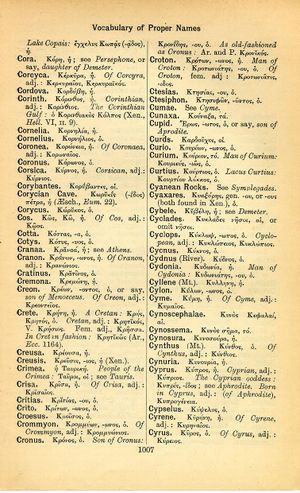Cotys
ἆρον τὸν κράβαττόν σου καὶ περιπάτει → take up thy bed and walk, take up your bed and walk, pick up your mat and walk
English > Greek (Woodhouse)
Κότυς, -υος, ὁ.
Latin > English (Lewis & Short)
Cŏtys: tyis (acc. -tȳn, rarely -tym; abl. -tye), and Cŏtus, i, m., = Κότυς,
I the name of several Thracian princes.
I A ruler of the coast of Thrace B. C. 382-356, son-in-law of Iphicrates, Nep. Iphicr. 3, 4; id. Timoth. 1, 2; Val. Max. 3, 7, ext. 7.—
II Cotys II., king of the Odrysæ, an ally of Perseus in his war against Rome, Liv. 42, 29, 12; 42, 51, 10; 42, 67, 4; Eutr. 4, 6.—
III Cotys III., king of the Odrysæ, Cic. Pis. 34, 84; Caes. B. C. 3, 4; 3, 36; Luc. 5, 54.—
Cotys V., grandson of III., Tac. A. 2, 64 sqq.; 4, 5.—
A brother of Mithridates, prince of the Bosporus, Tac. A. 12, 15; 12, 18.
Latin > French (Gaffiot 2016)
Cŏtўs, yis ou yŏs, m., nom de plusieurs rois barbares : Cic. Pis. 84 ; Liv. 42, 29 ; Tac. Ann. 12, 15.

